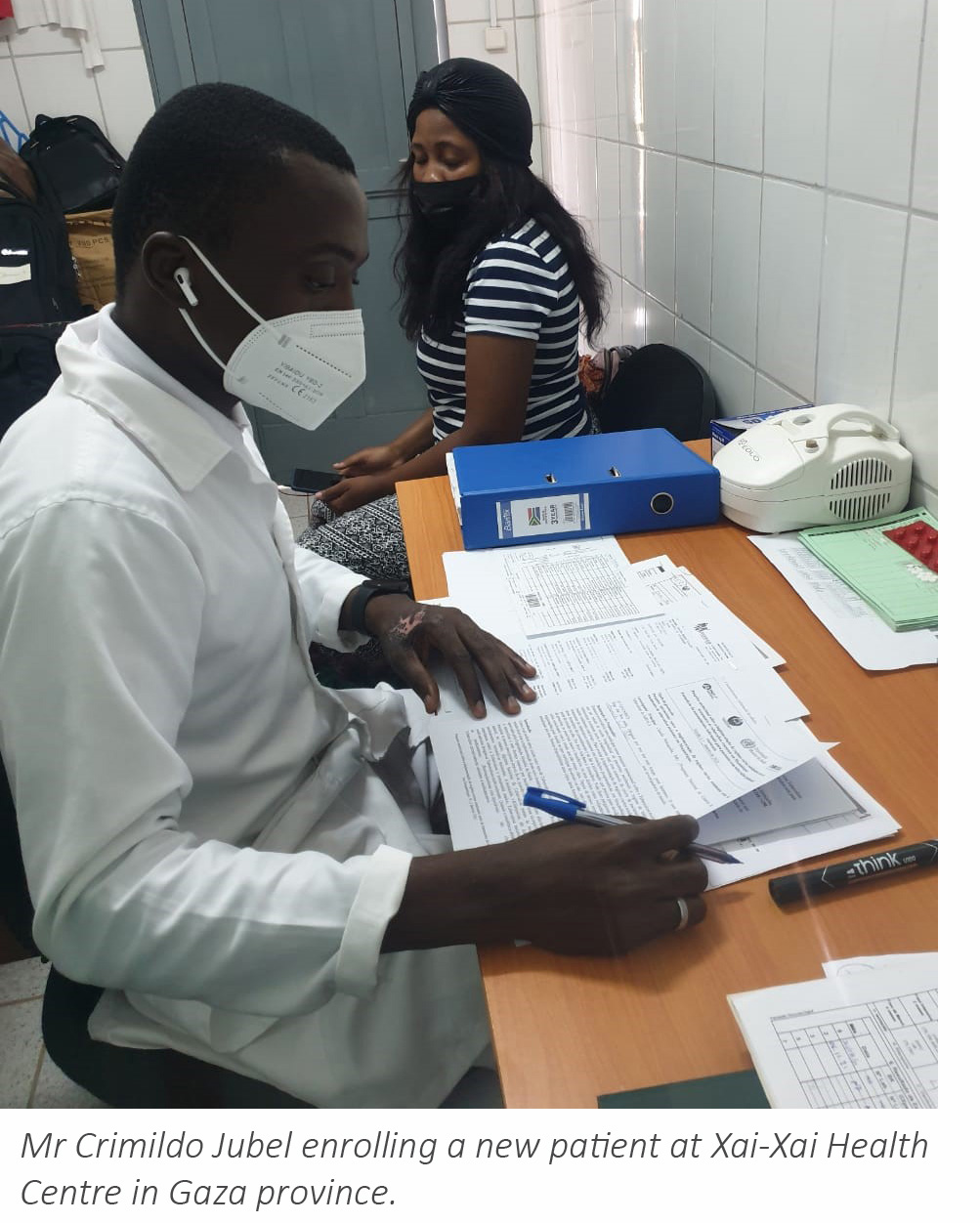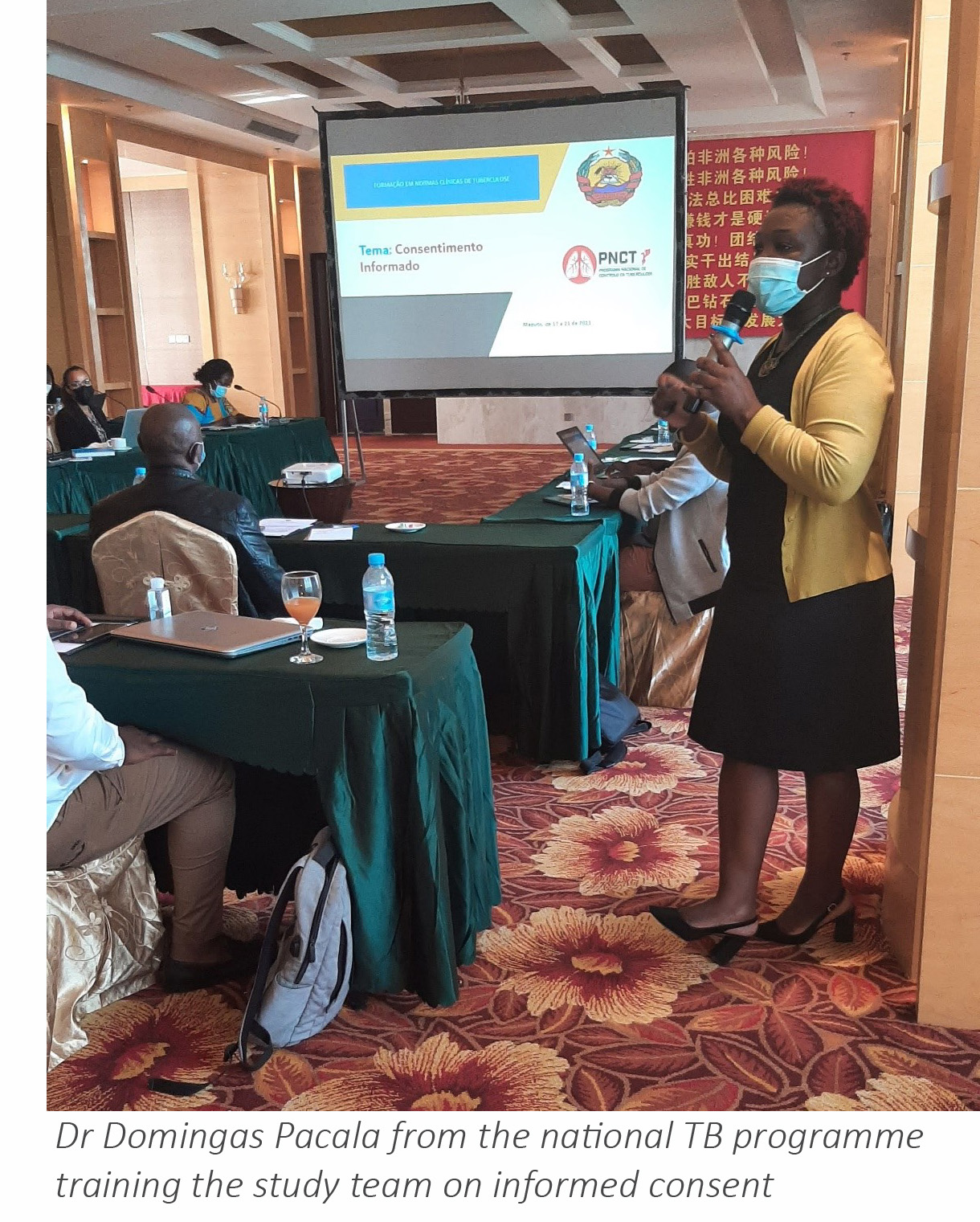TDR, in collaboration with The Global Fund to Fight AIDS, Tuberculosis and Malaria, are supporting a study in Mozambique using the ShORRT operational research package that is being conducted in 33 health facilities to improve drug-resistant TB diagnosis, treatment coverage and adherence.
In the latest World Health Organization (WHO) guidelines on drug-resistant tuberculosis (DR-TB) treatment, modifications to the recommended all-oral treatments for multidrug- and rifampicin-resistant (MDR/RR) TB and novel regimens for patients with extensively drug-resistant TB are encouraged under operational research conditions.
 TDR, in collaboration with the WHO Global Tuberculosis Programme and technical partners, has developed the ShORRT operational research package (Short, all-Oral Regimens for Rifampicin-resistant Tuberculosis) to support the implementation of such drug regimens.
TDR, in collaboration with the WHO Global Tuberculosis Programme and technical partners, has developed the ShORRT operational research package (Short, all-Oral Regimens for Rifampicin-resistant Tuberculosis) to support the implementation of such drug regimens.
Since its official launch in Hyderabad, India, in November 2019, the ShORRT initiative is now involving and supporting 26 countries worldwide, working alongside WHO regional and country offices, academia, technical partners such as KNCV Tuberculosis Foundation, the Union and Damien Foundation, and funding agencies such as the United States Agency for International Development (USAID) and The Global Fund to Fight AIDS, Tuberculosis and Malaria.
A total of over 4,000 patients worldwide are estimated to be enrolled in the studies that are part of the ShORRT initiative. Four broad modifications to the recommended shorter all-oral treatments for fluoroquinolones-sensitive MDR/RR-TB patients and three shorter all-oral treatments regimens for fluoroquinolones-resistant MDR/RR-TB patients are being investigated across all studies.
In the African region, Benin, Burkina Faso, Central African Republic, Democratic Republic of the Congo, Ghana, Guinea, Mozambique, Nigeria, Togo and Zimbabwe are among the pathfinder countries conducting operational research on modified shorter all-oral regimens for MDR/RR-TB patients.
The ShORRT study in Mozambique
TB remains a public health threat and a leading cause of death in Mozambique, where addressing the TB epidemic is significantly constrained by challenges in the health sector and poor access to services.
TB incidence rates have not improved in recent years, and the TB epidemic is compounded by the generalized HIV epidemic. In 2020, an estimated 115 000 people (368 cases per 100 000 people) fell ill with TB in Mozambique. Yet, according to the latest report from the Ministry of Health of Mozambique, only 97 093 cases were reported, leaving about 16% of people with TB unreached by the health system.
 Approximately 12 500 people died from the disease, and about 1364 patients were diagnosed with MDR/RR-TB. Although improving, treatment success among MDR/RR-TB patients remains low (66% for patients who started their treatment in 2018).
Approximately 12 500 people died from the disease, and about 1364 patients were diagnosed with MDR/RR-TB. Although improving, treatment success among MDR/RR-TB patients remains low (66% for patients who started their treatment in 2018).
In this context, improving TB diagnosis, treatment coverage and adherence is a clear public health priority. For MDR/RR-TB, this also means implementing shorter all-oral drug regimens that reduce the duration of treatment, the need for daily encounters between patients and healthcare staff for injections at the health facility, and the occurrence of adverse reactions.
During 2020, the national TB control programme of Mozambique adapted the ShORRT research package and developed a study that aims to evaluate the effectiveness and safety of two modified Bedaquiline-containing regimens: a drug regimen comprised of 4 to 6 months of linezolid, bedaquiline, levofloxacin, and clofazamine, and 5 months of bedaquiline, levofloxacin and clofazamine for patients with TB sensitive to fluoroquinolones; while patients with TB resistant to fluoroquinolones will receive 6 months of bedaquiline, pretomanid and linezolid (BPaL regimen).
In addition, the study also aims to assess the impact of these novel drug regimens on the health-related quality of life of patients, as well as stigma experienced by MDR/RR-TB patients and healthcare workers.
The study, financially supported by the Global Fund, will be conducted at study sites dedicated to the programmatic management of drug-resistant TB across 33 health facilities in Mozambique.
The study will recruit 720 patients, of whom 360 patients will be enrolled in the group receiving the modified all-oral shorter regimen between July 2021 and January 2022. The comparator group will include 360 patients receiving the long all-oral regimen in use in the country, for whom data have been collected between January 2020 and January 2022.
Despite the challenges posed by the current COVID-19 pandemic, the study has been swiftly established during 2020 through a mix of virtual sessions with the national TB programme, the Global Fund and WHO/TDR teams, and on-site activities. These include the readiness assessment of the study sites, the customization and piloting of the generic ShORRT data collection platform using the REDCap software, as well as training of data collectors and stakeholders on the study procedures. The first patient started the new regimen in the Primeiro de Maio Health Center in Maputo City in June 2021.
In addition to investigating the safety and effectiveness of the novel treatment regimen, the study in Mozambique will also explore the potential stigma experienced by DR-TB patients. TB-related stigma is an important social determinant of health which can have a considerable impact on individuals and communities, including delays in seeking health care and the ability to manage illness and complete treatment.
 Persons with DR-TB may be uniquely exposed to and disadvantaged by stigma, and their experiences of stigma often differ markedly from patients with drug susceptible TB. This study will employ a mixed-method approach to assess and compare stigma experienced by MDR-TB patients on the novel treatment regimen and by MDR-TB patients receiving the standard of care. Prevalence of stigma will be measured through a quantitative approach employing scales. This will be complemented by qualitative approaches that will be used to assess knowledge, attitudes, and beliefs about MDR-TB and its treatment, and will help place the severity of MDR-TB stigma in the context of patients’ quality of care.
Persons with DR-TB may be uniquely exposed to and disadvantaged by stigma, and their experiences of stigma often differ markedly from patients with drug susceptible TB. This study will employ a mixed-method approach to assess and compare stigma experienced by MDR-TB patients on the novel treatment regimen and by MDR-TB patients receiving the standard of care. Prevalence of stigma will be measured through a quantitative approach employing scales. This will be complemented by qualitative approaches that will be used to assess knowledge, attitudes, and beliefs about MDR-TB and its treatment, and will help place the severity of MDR-TB stigma in the context of patients’ quality of care.
“Mozambique has made important progress in the fight against tuberculosis, but important gaps in detection and treatment still remain. To address these gaps, the move towards all oral and shorter regimens is a fundamental step to put more patients on care with a treatment that is better tolerated and more effective,” said Dr Anna Scardigli, Senior Disease Advisor, TB, the Global Fund. “As the main funder of the TB programme in Mozambique, the Global Fund is very pleased to collaborate with TDR on the ShORRT study.”
For more information, please contact Dr Corinne Merle.

